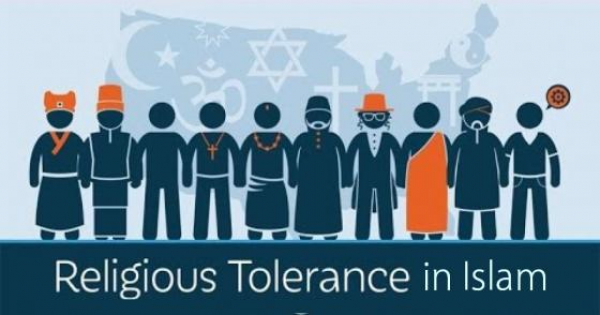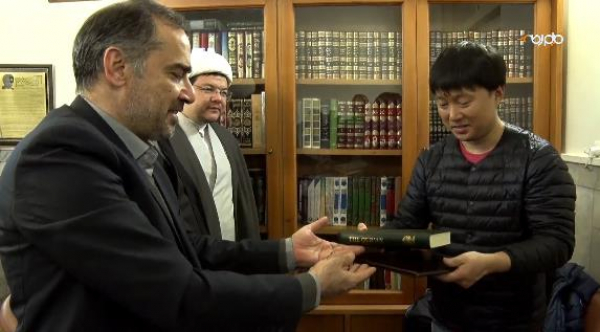One of the strongest and most deep-rooted links in human relations, is the tie of brotherhood. Brothers love each other, are benevolent towards each other, and share each other's joys and sorrows. Sometimes differences may occur between brothers, causing anxieties, but very soon these acrimonies are replaced by affection and sincerity, and rifts completely forgotten. Islam makes use of this firm link in order to strengthen social order and ameliorate human relations, and considers all devout Muslims as true brothers.
As two brothers are joined together through their father, the Seal of the prophets is regarded as a father of the Ummah in Islam, and the Muslims as his children. In this way, all the Muslims have been considered as brothers. In this verdict, namely Islamic brotherhood, there exists no boundary, and all Muslims from any race, locality and language are covered by this law, and are regarded as brothers by Islam. The holy Quran speaks explicitly about this matter and says:
إِنَّمَا الْمُؤْمِنُونَ إِخْوَةٌ فَأَصْلِحُوا بَيْنَ أَخَوَيْكُمْ ۚ وَاتَّقُوا اللَّهَ لَعَلَّكُمْ تُرْحَمُونَ
“The believers are but brethren, therefore make peace between your brethren and be careful of (your duty to) Allah that mercy may be had on you.”(1)
As history shows, prior to the advent of Islam, there were many differences and separations among the people. With the liberating teachings of Islam, the spirit of brotherhood was blown into the people, and this Islamic brotherhood was created. The holy Quran says about this matter:
وَاعْتَصِمُوا بِحَبْلِ اللَّهِ جَمِيعًا وَلَا تَفَرَّقُوا ۚ وَاذْكُرُوا نِعْمَتَ اللَّهِ عَلَيْكُمْ إِذْ كُنْتُمْ أَعْدَاءً فَأَلَّفَ بَيْنَ قُلُوبِكُمْ فَأَصْبَحْتُمْ بِنِعْمَتِهِ إِخْوَانًا وَكُنْتُمْ عَلَىٰ شَفَا حُفْرَةٍ مِنَ النَّارِ فَأَنْقَذَكُمْ مِنْهَا
“And hold fast by the covenant of Allah all together and be not disunited, and remember the favor of Allah on you when you were enemies, then He united your hearts so by His favor you became brethren; and you were on the brink of a pit of fire...” (2)
In Islamic teaching certain rights have been prescribed for all Muslims and they are bound to perform those obligations. The fourth Imam (PBUH)(3) says:
وأما حـق اهل ملتک عامه فإضمار السلامه ونشر جناح الرحمه والـرفق بمسیئهم و وتألفهم واستصلاحهم وشکرمحسنهم ... فعمهم جمیعا بدعوتـک و انصرهم جمیعا بنصرتـک وأنزلتهـم جمیعـا منک منازلهـم ؛ کبیرهـم بمنزلـه الوالـد و صغیرهم بمنزله الولد و أوسطهم بمنزله الاخ ؛ فمن أتاک تعاهدته بلطف و رحمه ؛ وصل أخاک بما یجب للأخ على أخیه
“The right of your co-religionist brethren is that you should always and sincerely pray God for their health, be extremely kind to them, be lenient and sympathetic towards them, and endeavour to reform them. You should be thankful to their good ones, and must pray for all your co-religionist brethren, help them, and be considerate to each according to his condition. You should regard the aged as your father, the young as your children, and those of your age as brothers. When co-religionist brethren visit you, welcome and receive them kindly and warmly, and treat them in the same way that a brother treats another.” (4)
Imam Sadiq, the Sixth Imam, has said:
المسلم اخو المسلم و هو عینه و مرآته و دلیله، و لا یخونه و لا یظلمه و لا یخدعه و لا یکذبه و لا یغتابه
“A Muslim is a brother to another Muslim. He is like an eye for him (i.e. he shows his good and bad qualities); and is like his mirror (he shows his beauty and ugliness); and is his guide. A Muslim never acts treasonably to his brother, does not oppress him, does not play tricks on him, does not lie to him, and does not resort to fault-finding and backbiting towards him.”(5)
The holy prophet of Islam, describing the rights of Muslims towards each another, says:
... يغفر زلته، ويرحم عبرته، ويستر عورته، ويقيل عثرته، ويقبل معذرته، ويرد غيبته، ويديم نصيحته، ويحفظ خلته ...
“A Muslim should connive at the errors of his co-religionist brother; have pity in his troubles; keep his secrets; disregard his mistakes; accept his excuse; defend him against the malicious and the fault-finders; act as a counsellor for him; and maintain friendly relations with him. When that brother-in-faith is sick, he should visit him; accept his gift; reward him reciprocally for his presents; thank him for his kindnesses; speak well with him; be friendly with his friends; not abandon him in trouble; wish for him what he wishes for himself, and despise for him what he himself despises.”(6)
Imam Sadiq, the sixth Imam, says:
أَحِبَّ لِأَخِيكَ الْمُسْلِمِ مَا تُحِبُّ لِنَفْسِكَ وَإِذَا احْتَجْتَ فَسَلْهُ وَإِنْ سَأَلَكَ فَأَعْطِهِ لا تَمَلَّهُ خَيْراً وَلا يَمَلُّهُ لَكَ كُنْ لَهُ ظَهْراً فَإِنَّهُ لَكَ ظَهْرٌ إِذَا غَابَ فَاحْفَظْهُ فِى غَيْبَتِهِ وَإِذَا شَهِدَ فَزُرْهُ وَأَجِلَّهُ وَأَكْرِمْهُ فَإِنَّهُ مِنْكَ وَأَنْتَ مِنْهُ ...
“Cherish for your Muslim brother what you cherish for yourself. If you need something, ask him for it: and if he needs something, do not refuse it to him. Do not abstain from generosity to him nor express annoyance. He too in his turn, should not abstain from showing goodness to you. Act as his supporter, since he, too, supports you. In his absence, protect his honour. When he returns from a journey, visit him. Respect and honour him. He belongs to you, and you belong to him, if he is harsh towards you, do not sever your relations with him, but ask him for pardon. If he meets good fortune, thank God for it, and if he faces a difficulty, hasten to assist him. If his enemies resort to trickery against him or set a trap for him, aid him and prevent him from being caught.” (7)
What was mentioned was an example of the rights of co-religionist brethren which have been commanded by Islamic teachings. Next to these general injunctions, other duties of Muslim towards each another have been considered carefully by the exalted leaders of Islam in separate chapters, and each obligation has been strongly emphasized.
*****
Fellowship means assisting co-religionist brethren and aiding them financially. Religious narrations have attached much importance to this matter which ameliorates the life of deprived classes, and creates affection and solidarity among Muslims, and this is regarded as a necessary attribute of every devout Muslim, and is rewarded fittingly by God. Imam Sadiq (PBUH) says:
تقربوا الی الله تعالی بمواساۀ اخوانکم
“With fellowship and assistance to your co-religionist brethren, make yourself a favorite at God's threshold.” (8)
The holy prophet of Islam said in his will to Imam Ali:
سيد الاعمال ثلاث خصال: انصافك الناس من نفسك ومواساة الاخ في الله عز وجل ، وذكرک الله تعالى على كل حال
"Three things are the best acts; first, to treat people with equity and justice; second to assist your co-religionist brethren as fellows and aid them financially; and third, to remember God under all conditions." (9)
Imam Ali (PUBH) has said:
مواساة الاخ في الله عز وجل تزيد في الرزق
“Showing fellowship to co-religionist brethren and helping them in the way of God, will increase one's sustenance.” (10)
Waghedi, who was a great scholar in the time of caliph Ma'emoun, says: “I had two friends one of whom was of the Hashemi Family. We were such sincere friends that we were really like one spirit in three bodies. One of those years, at the festival time, I was on the rocks with poverty. My wife said: ‘We two can put up with all discomforts and hardship, but these children give me a heart-burn, since I see other children dressed in new clothes duly adorned for the festival, whereas these children's clothes are old and worn out. Think of a way if you can, and get some money to enable me to buy come clothes for them.’
I pondered for some time, but could find no way. At last I wrote a letter to my Hashemi friend, asking him to help me if he could.
My friend sent me a sealed bag and wrote that it contained one thousand drachmas, I had not yet unsealed the bag when a messenger arrived from the other friend, reporting his great need and asking for help. I sent him the bag without seeing the contents, and went to the mosque feeling very depressed. I felt so ashamed to face my wife that I spent the whole night in the mosque. In the morning, I went home and contrary to what I thought she smiled cheerfully at me, and expressed much glad not for the generosity that I had shown to my friend and had given priority to him over myself.
Source: http://en.al-shia.org/content/brotherhood-and-fellowship-islam-1
NOTES:
_______________________________________________________________
1. The Quran 49:10
2. The Quran 3:103
3. The abbreviation 'P B U H' stands for 'peace be upon him', and is usually placed after the name of an Imam.
4. Bihar-al-Anwar, vol.74, p.21, and Tohaf-ul-Uqool p.277.
5. Kafi, vol.2, p.166.
6. Bihar-al-Anwar, vol.74,
7. Kafi, vol.3, p.263.
8. Khesal-e-Sadoogh, vol.1,p.8
9. Bihar-al-Anwar, vol.74,p.392.
10. Bihar-al-Anwar, vol.74,p.392.


























